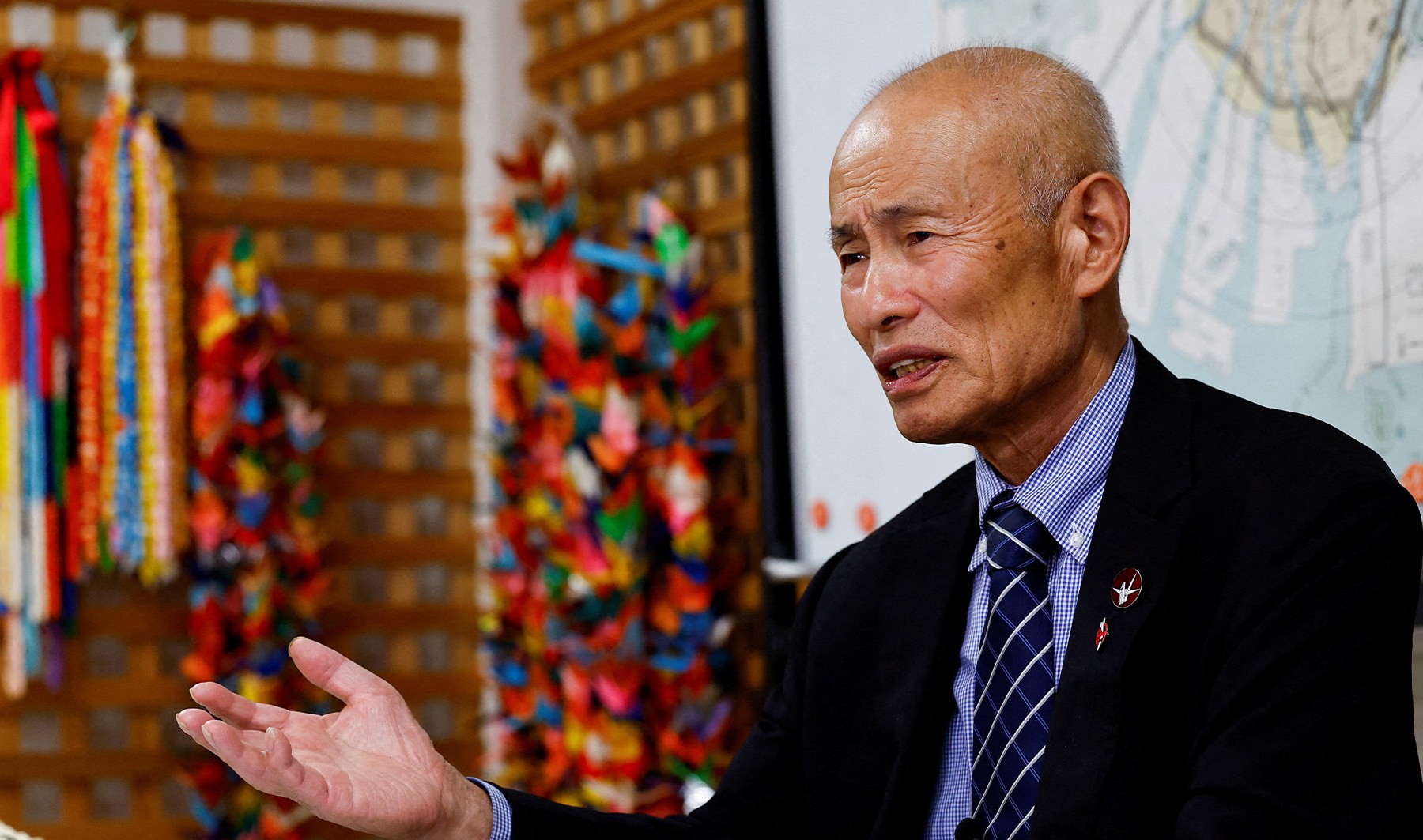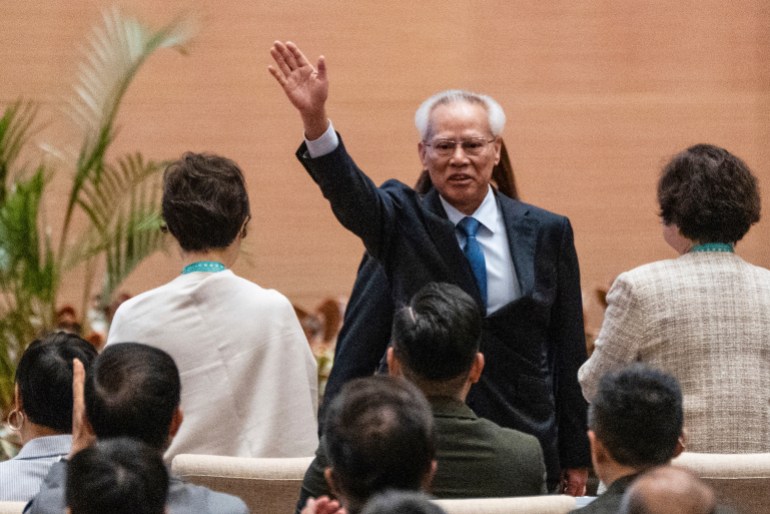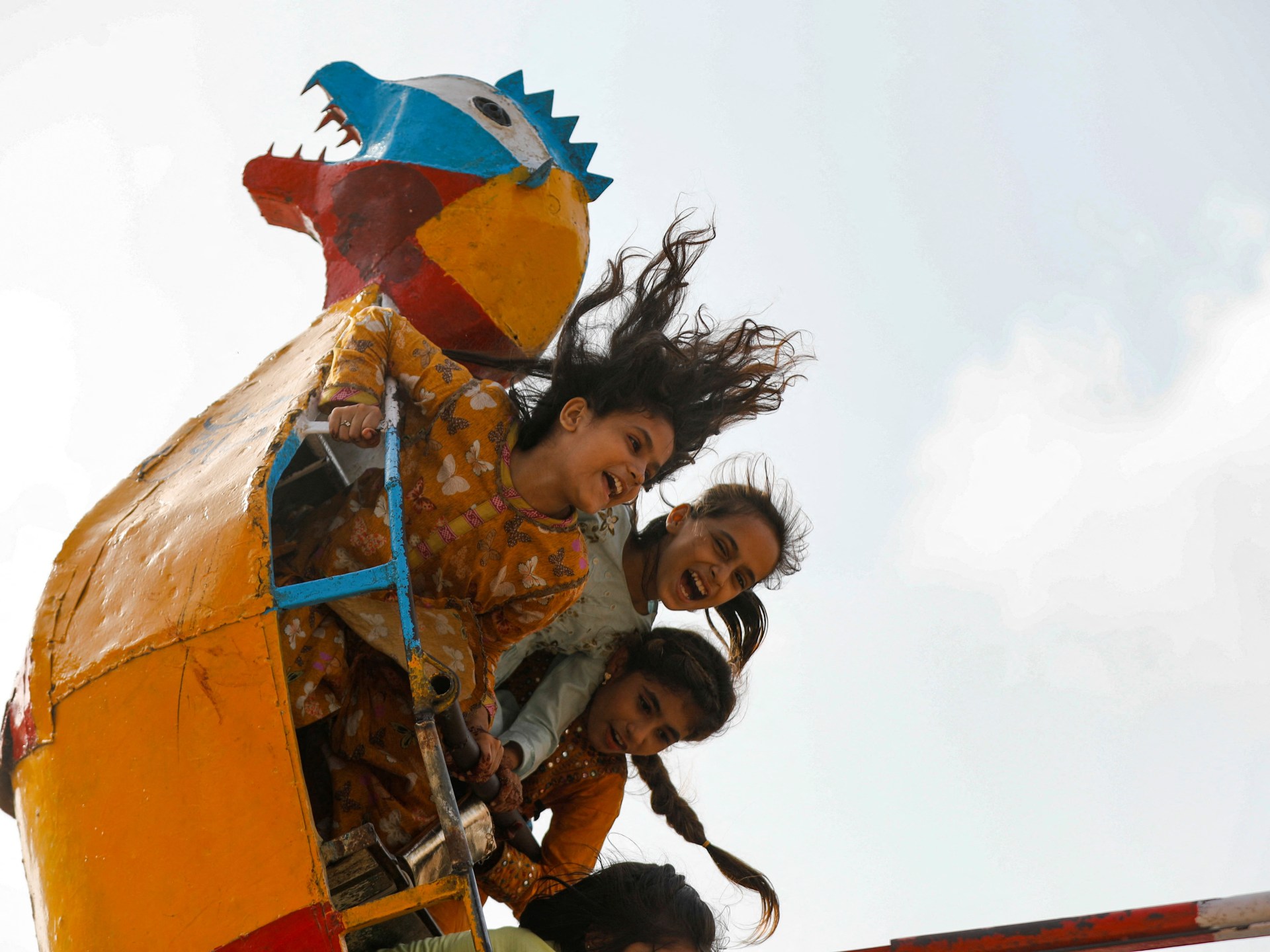Video: Massive fuel tank explosion in Russia’s Chechnya kills four

Footage shows the moment a fuel tank explodes at a petrol station in Chechnya, in Russia, causing a huge fireball. Four people, including two children, were killed in the blast.

Footage shows the moment a fuel tank explodes at a petrol station in Chechnya, in Russia, causing a huge fireball. Four people, including two children, were killed in the blast.

After defeating Russian-born Canadian boxer Dmitry Bivol in Saudi Arabia with a majority decision, Artur Beterbiev has been declared the undisputed light-heavyweight world champion.
Two of the three ringside judges scored the fight 115-113 and 116-112 to Beterbiev, while the other called it tied at 114-114 at Riyadh’s Kingdom Arena on Saturday.
Both men were previously undefeated, with 33-year-old Bivol holding the WBA belt and Beterbiev, 39, the reigning WBC, WBO and IBF champion.
Bivol became the first man to go the distance against a champion who had a track record of winning either by knockout or stoppage by taking the bearded Beterbiev to the full 12 rounds in the Saudi capital.
“I wanted to box more, I don’t like this fight. I was a little bit uncomfortable”, Beterbiev said after his win.
“It was uncomfortable because I’m typically not anticipating the bell.”
The four recognized major belts were handed to one man for the first time during the headline event, which was postponed from June 1 due to a knee injury suffered by Montreal-based Beterbiev.
American Roy Jones Jr., who defeated Reggie Johnson to reclaim the WBA, WBC, and IBF belts in 1999, was the last undisputed light heavyweight champion.
In a high-quality fight between the powerful and aggressive Beterbiev and a more fluid opponent who landed eye-catching early blows and had the better of the early rounds, Bivol made himself a moving target.
At the halfway point, there was little conflict between the two, with Beterbiev likely to be behind but close calls between each round. The purists had plenty to choose from.
Bivol stayed put and fired back some potent combinations despite Beterbiev knowing he had to end the match with a bang in the final two rounds.
“I just congratulate Artur and his team, he deserves it”, Bivol, who expects a possible rematch, said after the fight.
“I did my job, I felt I could do better, I always feel I can do better, but that’s the opinion of the judges. He won”.
A fight for the ages! Congratulations to our Champion, Arthur Beterbiev on becoming undisputed ruler of the Lt. Heavyweight division. Congratulations to Dimitri Bivol for a fantastic performance that kept fight fans on the verge of awe. pic. twitter.com/mz2A67wKlb
After Jack Massey’s corner threw in the towel two minutes into the sixth round with the defeated Briton bleeding from a cut to the side of his nose, Australia’s Jai Opetaia previously kept his IBF cruiserweight world title.
The convincing win took Opetaia’s record to 26-0.
In a unanimous decision over whether to defend her WBC featherweight belt to Britain’s Raven Chapman, unbeaten Australian Skye Nicolson defeated Raven Chapman to win the first women’s world title fight in Saudi Arabia.

I believed that those who worked tirelessly for peace in Gaza would merit it. The Nobel Peace Prize-winning anti-nuclear campaigner from Japan claims he was surprised they were awarded the award in place of people who were attempting to stop Israel’s occupation of Gaza.

Former judge Sam Hou Fai has been elected chief executive-designate of Macau, China’s special administrative region, setting him up to be the leader of the casino-dominated area next to Hong Kong.
Sam received 394 votes out of 398 ballots cast in an election that lasted about one hour and 35 minutes on Sunday, according to a statement on the government’s website.
He is the territory’s first leader born in mainland China. Critics fear the move will see Beijing’s agenda take priority over business interests.
After being announced as the chief executive-elect, Sam walked onto the stage to applause from the committee members. “It is the highest honour of my life”, the 62-year-old said.
He pledged to uphold national sovereignty, accelerate the city’s economic diversification, and better integrate it into the national development plans.
The appointment of Sam to a five-year term as chief executive must be approved by China’s central government.
“This was an election with one candidate. Ordinary residents here can’t vote here”, Al Jazeera’s Laura Westbrook reported from Macau. Some of the people I’ve spoken to “were unaware that today was an election.”
In 1962, Sam was born in Guangdong, a province in southern China. He received his law degree from Peking University in Beijing’s prestigious law school.
He previously practiced law in mainland China while also studying Portuguese law, culture, and language at the Portuguese University of Coimbra.
The only Chinese city with legal casino gaming is Macau. Beijing has called for the city to diversify its gambling-reliant economy.
“He]Sam] is the first leader of Macau that doesn’t come from a business background, and he has had some pretty strong comments about the gambling industry here – where he says that he wants to diversify it away from gambling”, Al Jazeera’s Westbrook said.
Sam has promised to accelerate the current government’s plan to boost tourism and other sectors such as traditional Chinese medicine, finance, exhibitions and commerce.
According to analysts, the city will still need to rely on the gambling industry for government funding to support the city’s welfare and fulfill other Beijing-imposed objectives.

Here is the situation on Sunday, October 13, 2024.

Zuha Siddiqui is currently designing her new house in Karachi, creating a blueprint for her future life in Pakistan’s largest metropolis.
Her parents will live in the downstairs portion of this house, “because they’re growing old, and they don’t want to climb stairs”, she says.
She will live in a separate portion upstairs, with furniture she likes. According to Siddiqui, who recently celebrated her 30th birthday and wants a place to call her own, she tells Al Jazeera over a phone call.
For the past five years, Siddiqui has covered issues involving technology, climate change, and labor in South Asia. She now works remotely, freelancing for local and international publications.
Zuha is one of a growing number of young people in South Asia who doesn’t want to have children despite all of her plans for a family of her own.
South Asia is facing a demographic challenge. Birth rates are on the decline, as is the case with a large portion of the rest of the world.
Countries in South Asia with birth rates that have remained high are finally showing signs of following the same trend, despite the West and Far East Asian nations like Japan and South Korea being most frequently blamed for the decline in birth rates.
Generally, to replace and maintain current populations, a birth rate of 2.1 children per woman is required, Ayo Wahlberg, a professor in the anthropology department at the University of Copenhagen, told , Al Jazeera.
According to a 2024 US Central Intelligence Agency publication comparing fertility rates around the world, in India, the 1950 birth rate of 6.2 has plummeted to just above 2, it is projected to fall to 1.29 by 2050 and just 1.04 by 2100. The fertility rate in Nepal is now just 1.85, in Bangladesh, 2.07.
Although the birth rate in Pakistan is currently above the replacement rate of 3.32, it is obvious that young people there are not immune to the pressures of contemporary life.
“My decision to not have children is purely monetary”, says Siddiqui.
Siddiqui’s childhood was marked by financial insecurity, she says. “Growing up, my parents didn’t really do any financial planning for their children”. This was the case for several of her friends, women in their 30s who are also deciding not to have children, she adds.
Although her parents paid for their children’s education, she claims that it is not typical for Pakistani parents to set aside money for a college education.
Siddiqui claims that even if she were attached, her decision to not have children would stand. She made the decision shortly after she reached financial independence in her mid-20s. “I don’t think our generation will be as financially stable as our parents ‘ generation”, she says.
High inflation, rising living costs, trade deficits and debt have destabilised Pakistan’s economy in recent years. The country’s $7 billion loan program was approved by the International Monetary Fund (IMF) on September 25.
Like many Pakistani teenagers, Siddiqui is very concerned about the future and whether she will be able to get by on a decent income.
Living expenses in the South Asian nation continue to rise despite inflation, though at a slower rate than before. The Consumer Price Index (CPI) rose by 0.4 percent in August after a 2.1 percent increase in July, local media reported.
Pakistan is not alone. Most countries in South Asia are grappling with slow economic growth, rising inflation, job shortages and foreign debt.
Meanwhile, as the global cost of living crisis continues, couples find they have to work more hours than before, leaving limited room for a personal life or to dedicate to children.
In a study on “unintended infertility,” sociologists Sharmila Rudrappa and IT workers in Hyderabad, India, were asked to consider whether people might not experience infertility at the beginning of their lives but might make choices that could lead to infertility later due to circumstances.
Her study participants told her that they “lacked time to exercise, they lacked time to cook for themselves, and mostly, they lacked time for their relationships. Work left them exhausted, with little time for social or sexual intimacy”.
Mehreen*, 33, who is from Karachi, identifies strongly with this. She lives with her husband, his parents, and his senior grandparents.
Both she and her husband work full-time and say they are “on the fence” about having children. Emotionally, they say, they do want to have children. Rationally, it’s a different story.
“I think work is a big part of our lives”, Mehreen, who works in a corporate job at a multinational company, told Al Jazeera.
They are “almost sure” they will not have children, citing the expense of doing so as one of the reasons. “It’s ridiculous how expensive the entire activity has become”, says Mehreen.
“I think the generation before us saw the cost of raising kids as an investment in them,” he said. She explains that many of the older generations view having children as a way to provide for themselves with financial security in the future, and that their children would be expected to provide for their parents in old age. That won’t work for her generation, she says – not with the economic decline the country is undergoing.
The gender gap, another significant issue, separates the younger generation from their parents.
Despite the fact that both of them are making money for the household, Mehreen claims that she is acutely aware that her husband should take the lead in parenting. He would want to be an equal parent, but he is naturally aware that he is not wired to understand parenting in this society.
Do our respective mothers view us as equal partners, but my husband and I do? Maybe not, “she says.
Besides money and domestic responsibilities, other factors have influenced Mehreen’s decision as well”. Obviously, I always think that the world is going to end anyway. Why bring a life into this messed-up world? “she says dryly.
Many South Asians are concerned about raising children in a future uncertain world rife with climate change, just like Mehreen.
Mehreen remembers how, as a child, she never thought twice about eating seafood”. Now, you have to think so much, considering microplastics and all of that. If it is this bad now, what will happen 20 years, 30 years from now? “
In her essay collection, Apocalypse Babies, Pakistani author and educator Sarah Elahi examines the challenges of raising a family in a time when climate anxiety predominates over young people’s concerns.
She describes how, as a child in Pakistan, climate change was brushed aside throughout her life. However, with rising global temperatures, she notices how her own children and students are increasingly living with constant” anthropogenic anxiety”.
Elahi’s sentiments ring true for many. The incapacitating effects of environmental damage, according to experts and organizations like Save the Children, range from more severe heatwaves to scorching heatwaves and deadlier floods.
Siddiqui claims that when she was reporting on the environment in Pakistan as a journalist, she realized it would be impossible to have children. Would you really want to introduce a child into a world that, should you pass away, would be utterly disastrous? “she asks.
South Asia is one of the regions of the world that is most affected by climate change, according to several writers and researchers, including those associated with the Atlantic Council and University College London (UCL).
According to the Swiss climate organization IQAir’s 2023 World Air Quality Report, Bangladesh, Pakistan, and India have the worst air quality among the 134 nations that were surveyed.
According to a review released by the Environmental Research Group at Imperial College London in April 2023, poor air quality has an impact on everyone.
According to that review, polluted air, inhaled by pregnant women, for example, can prevent the fetus from developing. Additionally, it established links between poor air quality and low birth weight, miscarriages and stillbirths. These are all just more reasons not to have children, according to young women like Mehreen and Siddiqui.
Siddiqui has developed a strong support network from friends who share her values, a former college roommate, her best friend since the ninth grade, and some of the people she has stayed close to in recent years.
In an ideal world, she says, she would be living in a commune with her friends.
Fears about being lonely in the future sometimes still creep up in Siddiqui’s mind, however.
She was seated with two of her friends, who were late-30s women who, like her, were against having children, in a cafe a week before she spoke to Al Jazeera.
They discussed their apprehensions about passing away alone. It’s something that plagues me quite a bit, “Siddiqui told her friends.
But, now, she shakes this off, hoping it is an irrational fear.
When I’m 95, I don’t want to have children just to have someone look after me. I think that’s ridiculous. “
Siddiqui claims she and her best friend spoke in a conversation in the cafe.
” She was like, ‘ No, you’re not gonna die alone. I will be there’. “